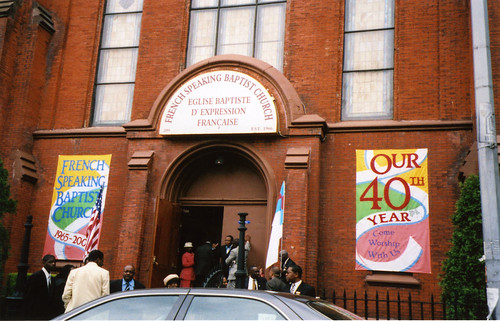The Joy Of Small Things
Happiness is noticing blinking lights on your answering machine just past midnight in your hot apartment, bleary eyed as you try to open a window to let out that bee that somehow made it past the nets or alternatively dodge mosquitos to avoid the West Nile Blues.
Happiness occurs when you check your messages and hear that your favourite aunt has given birth to a new cousin, a baby girl.
Happiness is forgetting all about the bees and mosquitos and screaming to wake your neighbours up.
Happiness is the 3 hour conversation you then have with your parents back home about life, family, change and everything else.
Happiness is hearing about your grandma so overjoyed that she broke out in voluminous prayer. Your symptoms are genetic.
Happiness is going to sleep with a smile on your face.
Happiness is the dream you have of blowing off work the next day to catch the Fung Wah bus to head to New York.
Akua Abigail has arrived a few weeks early but is wonderfully healthy and her mum is similarly content.
Although we are thoroughly modern, having your first child in your forties is still extraordinary and there had been some trepidation all around.
Happiness will be the mad rush to New Jersey to welcome mother and daughter when they are discharged from the hospital over the weekend.
Happiness is being in England, Germany, France or Ghana (in addition to being thoroughly modern, we are a thoroughly dispersed family) and hearing said news and joyfully negotiating with travel agents to change flight plans handwaving away the prospect of paying several thousand of dollars for tickets to see your daughter or niece.
I first heard about my aunt's "loaded condition" a few months ago on the day I made my own modest proposal and a dear cousin stepped into matrimony. Thus the entire family has been smiling ever since and anticipating a wonderful end of July. Thank goodness I caught a few glimpses of her pregnancy and we all have bits to add for the historical record when I went to visit her. But back to happiness...
Happiness is remembering the various churches you passed in Brooklyn on that same day. New York's finest on display.
Happiness is recalling the name of the church you passed on your way to help a fellow bachelor out in Ikea and that confusing place we call the modern department store:
The Institutional Church of God in Christ. inc.
Happiness is trying to be a personal shopper and attempting to convince someone whose apartment has only a bed, computer, iPod, and beer in the fridge that it's worth it to spruce up since The Parents would be landing in just a few weeks to stay with him.
Happiness is your chutzpah when you, who are only a couple of weeks removed from confirmed bachelorhood,
have the gall to expound to your cousin on "thread counts" and explain that "some people" (you don't qualify who) may feel better in the morning if they slept on 450 thread count sheets rather than utilitarian prison-ware.
Happiness is recalling when you asked that young black woman in Target if "there were any deals on sets", her subsequent laugh and response that
"This is a family store!"since she mistook your enthusiasm for sets of bedsheets with garden-variety sexual propositions.
Happiness was the spontaneous laughter you all shared. She had just herself propositioned Mr Bachelor with a Target credit card with "An additional 15% off today's purchase" that finally tipped the deal and would ensure the success of your home decorating campaign.
Happiness is knowing that she lost the pen that you offered her for the credit card application your cousin and her filled out.
Happiness has been writing for the past few months with the replacement Target pen she gave you.
Happiness is the decor of furniture in Pierre Deux, which reminded you of the most awful florid French and English houses.
Happiness is the curious looks you exchanged with your cousin as you walked into Pierre Deux as you saw the bright colours and the knowledge that in future you'll be able to crack him up with that codeword.
Happiness is making phone calls to your other cousin now ensconced in Richmond Virginia for her to launch her browser and reserve a car at Newark Airport since both of you guys were not air travelers and apparently you can no longer just walk up to those rental locations and pick a car.
Happiness is remotely directing the web transaction from New Jersey and discussing car options knowing that you were at the mercy of this babe in Virginia, sweet talking her to make sure she picked a large sedan.
Happiness is her astute interior decorating advice about which shops to attack in your bachelor intervention.
"Door Store, Ikea, Secaucus outlets and Target".She pronounces Target as if it was some french word, that soft "g".
Happiness is leaving Ikea having only persuaded your cousin to buy a third of the things on his list
"I don't want to buy anything too permanent if I'll just be moving soon"and seeing some normally unemployed guys on the roadside wearing signs promising a
Closing Down Furniture Sale!!!
Everything Must Go!
Happiness is following the signs and gesticulating to the 5 or 6 "Breadcrumb Guys" and being directed to the back of a furniture warehouse, it turns out that it was Corts Rental Furniture. Oh joy: bargain-basement rates on items that literally fell off the back of a truck.
Happiness is avoiding that business of making eye contact with the clientele of fellow desperados that had similarly been drawn by the flashy (fleshy?) advertisements. It reminds you of teenage expeditions to some "special shops" in Soho in the Red Light district of London when a bunch of you managed to get away from chaperones during school trips. You both feel a little dirty about being titillated by this "product".
Happiness is the sight of the gruesome furniture therein and the jokes you exchanged with one of the brothers who worked there when you enquired about a dining room table.
"It's seen better days".
Happiness is cracking up and quipping that
It's been to war... It's just come back from Iraq or Afghanistan.
Happiness is all the people in that dank warehouse breaking up and beginning to comment on the forthcoming draft, and Dubya's grudge match with evildoers who "tried to kill his dad".
Someone started calling the furniture Weapons of Mass Destruction.
At that we had to leave, those verbal Scud missiles hit too close to home, passing right by our Patriot (Act) defenses and Star Wars shields.
Happiness is getting lost in the twilight zone of New Jersey on the way to visit your aunt. Did you know that there were 4 adjoining towns within a 2 mile radius that all have streets with the same name - and not just one street but 5 or 6 streets with the same name and layout and all near the same rail tracks? Did you know that neither Google Maps nor Mapquest had cottoned on to the strange archeology of the Garden State?
Happiness is the increasingly frantic phone calls as you were lost and drove right to her address only to not recognize the house that was there.
Hmm... Everything sure looked familiar.
Happiness is your pregnant aunt, after an hour of this business, heading to the Bank of America parking lots of the wrong 3 of the 4 towns in a bid to rescue both of you hapless bachelors from your Garden State misery in the streets of Teaneck, Bogota and the like.
Stay where you are. I'll find you.
Really?
Happiness is your cousin's cell phone. Both you and your aunt don't have one so of course you can't call her up while she's looking for you in the wrong towns.
Happiness is the huge plate of jollof rice and chichinga (suya the Nigerians would call it, and others more generally kebab) that you wolfed down when you somehow finally made it to her house. Google Maps had suggested 30 minutes for your 2 1/2 hour expedition. Home cooking made up for the difference and your aunt dotes on you.
Happiness is hearing your aunt arrange for your cousins in France to join you and gatecrash a wedding in London that you just mentioned you were about to attend next weekend.
Happiness is remembering the conversation you'd had just weeks earlier with your friend Kweku in which you told him to expect that Ghanaians would "always gatecrash weddings" and commiserating about the madness of wedding preparation, something you've just begun thinking about.
Happiness is realizing that, after a mere 5 minutes of trans-Atlantic conversation, it looks as if you will be leading a party of French gatecrashers to said wedding and imagining Kweku and Zai hyperventilating.
Happiness is your aunt asking for Kweku's mum's phone number.
"I don't want to talk to Kweku, he'll be too busy with the wedding. I want to talk to his mum."
Indeed.
Happiness is going to a bus stop to wait for a New Jersey transit bus to return to New York's Port Authority.
Happiness is realizing that she had looked at the wrong column on the schedule for Bus 168 so that you will have an hour to wait on this Sunday evening.
Happiness is the pair of you sitting at the bus stop and simply chatting about whatever comes to mind. That waiting hour becomes one of your fondest memories of your aunt in retrospect.
Happiness is discovering that you have a copy of your musings on Inauguration à L'Africaine and laughing with her as she reads it and you recount on the even more absurd items you didn't write about.
Happiness is seeing your aunt's permanent outrage and also when she encourages you to continue doing what you do:
"You should send it to the president. He should sack all of them. And you've written it in the nicest way."
Thus I'll modify Arundhati Roy's formulation and write a short piece about
The Joy Of Small Things
Life is Sweet
My favourite movie on this theme is of course Life is Sweet, Mike Leigh's brilliant exercise in celebrating small things from 1990. Delusions of restaurant grandeur, a slice of family life, dance classes, encounters with spoons and broken limbs, chocolate fetishes, eating disorders, sexual confusion, teenage angst, and most of all inimitable and life-affirming laughs. The decor of some of the rooms in this British middle class nirvana seemed to have come straight from Pierre Deux. It's a real pity it hasn't yet been released on DVD.
A Soundtrack of Small Things
As usual a playlist for this joint
- Anita Baker - Sweet Love
There you have it. - Incognito - Step Into My Life
Positivity is the thing. - Price Nico Mbarga - Sweet Mother
Ever since 1976, this has been the quintessential Highlife joint. Afrobeat was never more danceable or happy. Its lyrics are a celebration of African motherhood.Sweet Mother I No Go Forget You
For The Suffer Wey You Suffer For Me. - Cameo - Attack Me With Your Love
Baby
- Curtis Mayfield - Sweet Exorcist
Soul music's premier falsetto. - Bunny Mack - Let Me Love You
My Sweetie, My Sugar
My long search for a good copy of this continues... - Chaka Khan - Sweet Thing
How to start everyone singing in 4 bars. - Finlay Quaye - Your Love Gets Sweeter
Love gets sweeter every day
Love gets sweeter every way - Prince & The New Power Generation - Sweet Baby
Like a lullaby - Mary J. Blige - Sweet Thing
Puffed up hip-hop soul - Loose Ends - Mr Bachelor
You should have told me
From The Real Chuckeeboo, I need to do a Loose Ends appreciation at some point; they are truly London's finest. - U2 - Where The Streets Have No Name
a.k.a. New Jersey
See also: New York Trip
File under: life, happiness, children, babies, cousins, aunts, family, scramble, conversation, airlines, buses, plans, Small Things, New York, New Jersey, whimsy, funny, travel, journalism, storytelling, shopping, joy, food, jollof, toli
























